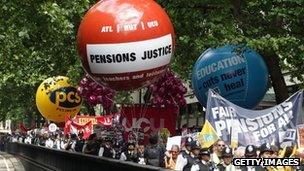Head teachers vote for strike action over pensions
- Published

Thousands of teachers have already staged industrial action over pension changes
Thousands of head teachers in England and Wales have voted in favour of strike action over changes to pensions.
Members of the National Association of Head Teachers (NAHT) could now join thousands of other public sector workers on strike on 30 November.
But the NAHT general secretary said he would be "delighted" if they did not have to go ahead with the action.
The strike, also supported by teachers and support staff, is likely to see thousands of schools closed.
The teaching profession is angered by planned government changes to the teachers' pension scheme (TPS) which, it says, will mean teachers working longer, paying more and receiving less when they retire.
NAHT members hold leadership positions in most special schools, 85% of primary schools and more than 40% of secondary schools in England, Wales and Northern Ireland, meaning disruption would be widespread.
Pupils' learning will be disrupted and working parents will be inconvenienced as they make arrangements for childcare on that Wednesday.
Ballot turnout
Some 24,000 members were balloted and turnout was 53.6%, with 75.8% in favour of strike action, the NAHT said.
It is the first time the NAHT has voted in favour of such action in its 114-year history.
Russell Hobby, general secretary of the NAHT, said while the union had a yes vote, it hoped to avoid calling industrial action.
"In many ways this is an unhappy milestone," said Mr Hobby.
"I have spoken at length to many school leaders and not one has been anything other than upset and sometimes downright angry that they have been forced into this situation as the only way to stand up for the profession and standards.
"We welcome the government's recent concessions as marking, finally, the start of genuine negotiations. It is sad that it has taken this long, but it is a start.
"We would like to avoid action if at all possible and will be negotiating intensely and in good faith in the run up to the 30th."
Schools Minister Nick Gibb said ministers had been "listening carefully" to teachers and heads and were continuing to hold serious discussions with the teaching profession about the reforms.
Russell Hobby: ''I would be delighted and every single one of my members would be delighted if we don't have to do this''
Mr Gibbs said: "It is right that the unions look very carefully at what is on the table before taking industrial action.
"Strikes benefit no-one - they damage pupils' education, disrupt and inconvenience parents' lives and risk the professional reputation of teachers in the eyes of the public."
On a visit to a school on Tuesday, Education Secretary Michael Gove urged teachers not to strike.
UK-wide disruption
The action on Wednesday, 30 November will cause disruption at schools across the UK, not just in England and Wales.
While the TPS is available to teachers in England and Wales, it is likely that teachers in Northern Ireland and Scotland will face similar changes to their pension schemes.
This led the Association of Teachers and Lecturers (ATL) to ballot its members in Northern Ireland and Scotland for strike action - members there have voted to join their English and Welsh colleagues in a programme of industrial action.
The NASUWT is now balloting more than 230,000 members across the UK for strike action. The results will be known on 18 November.
The National Union of Teachers (NUT), which only represents teachers in England and Wales, has voted for continuing action over pensions.
The other head teachers' union, the Association of School and College Leaders (ASCL), said it would move to a ballot if it felt negotiations had failed or were not progressing satisfactorily.
ASCL would not have time to ballot members in time for strike action on 30 November.
- Published14 September 2011
- Published1 July 2011
- Published15 June 2011